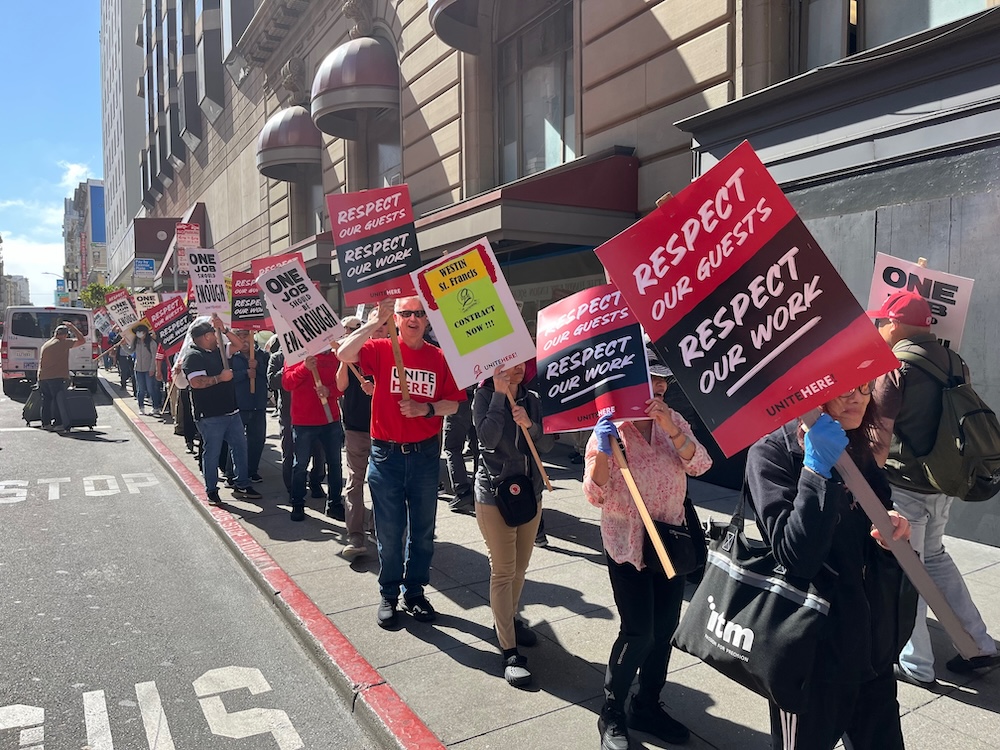There is no way to look at the settlement of the 92-day strike by hotel workers in San Francisco as anything other than a resounding labor victory.
The union members got everything they wanted; the hotels learned that this is still a union town, that you can’t operate a complex hospitality facility without your workers—and that guests are not going to be happy paying hundreds of dollars a night for a room that isn’t cleaned and service that doesn’t exist.

So for four years, there will be labor peace at the biggest hotels in town. The workers got raises—but just as important that got staffing guarantees, and they defeated a management plan to reduce health care benefits for new workers.
Mayor-elect Daniel Lurie is presenting this as his first major political victory, and the union leaders agree: Lurie played a key role in bringing recalcitrant hotel managers to the table.
“It wasn’t the deciding factor,” Anand Singh, chief negotiator for Local 2, told me. That, of course, was the strike, and the power of organized political and economic pressure. “But he was able to reach the right people, and get them to the table.”
The fascinating question, of course, it why it took this long—and why Mayor London Breed was unwilling or unable to push for a settlement. The answer to that says something about how money and power work in San Francisco—and the difference between old money and new money.
Hotel management is complicated: Hilton, for example, is a publicly traded company with giant hedge funds owning much of the stock.
Marriott Corporation is also a publicly traded company, but most of its hotels aren’t managed by Marriott; the giant corporation gives other companies franchises to operate hotels under the brand name. So when you negotiate with Marriott management, you aren’t negotiating with the owners.
The bankers have essentially taken over the local Hyatt Regency, so they had to be involved.
Joe Garafolo at the Chron says Lurie has a “superpower:”
It is one of the rare advantages of having a rich dude as mayor. He can pick up the phone, as in this case, and connect with people at the highest levels of power.
But it seems to me that the mayor of San Francisco is already a pretty significant person in the political world. So are Breed’s friends (including Vice President Kamala Harris). She has supporters and allies who are, if not as rich as Lurie, pretty seriously rich and pretty well connected to the world of other rich people. They were, apparently, no help.
The strike went on for more than three months; it was hurting the city’s economy and threatening more damage in the future. And yet, it took a person who isn’t even in office yet (and who had no direct support from the unions when he ran) to get those owners to the table.
Insiders told me Breed did make an effort, but unlike Lurie, wasn’t able to break through. Maybe she didn’t pull the right strings; maybe she, for all her ties to the city’s billionaire class, didn’t have the right strings to pull.
Maybe the likes of Ron Conway and the new techno-plutocracy that is her base wasn’t as effective as old, old, San Francisco money.
Maybe the new plutocracy doesn’t care about the hotel workers, or the hotels, or the city’s tourist economy; that does little or nothing for the bottom line of the tech industry, AI, and speculative real estate. Maybe the old-money Lurie connections were able to reach the people who actually own the hotels, who do care about their success or failure.
It’s a good sign, for the moment, that the incoming mayor was willing to work with a union that endorsed his opponents in the interests of the city; Breed, from my experience, would not have done that.
But it’s also a good sign, a better sign, that the hotels were forced to back down on all of their demands and give the union members what they wanted. Labor action and organizing still works in this city, and Local 2 ran a powerful strike.
Maybe Amazon is next.






